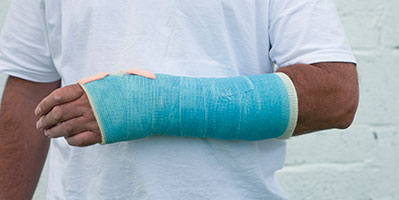Plaster casts can avoid the need for surgery for common wrist fractures, study concludes
Posted on 6 August 2020

The SWIFFT trial, conducted in collaboration with the University-based York Trials Unit, concluded that for a scaphoid waist fracture in the wrist, a plaster cast should be used in the first instance, with surgery only being considered if the bone doesn’t heal.
The findings are published in The Lancet today (6 August 2020).
Fracture of the scaphoid bone (one of eight small bones in the wrist) is common in young, active people, caused by a fall on the hand or the hand being suddenly forced backward. The research suggests that by opting for a plaster cast, patients can avoid the risk of surgery, while hospitals can keep service delivery simple and cost effective, without compromising patient outcomes.
The trial compared outcomes for patients who either had surgery to hold the broken scaphoid with a special screw, or had their wrist immobilised in a plaster cast.
After one year from the initial injury, patients were measured on a number of factors, including wrist pain and function.
The study showed no significant difference between the two groups in pain, function, days off work and the number of fractures that did not heal properly. But 12 per cent of patients who had surgery were assessed by the hospitals to have more complications following treatment compared to 2 per cent for the plaster cast group.
The researchers also considered the health economics of surgery versus plaster cast. Over the year, the cost of surgery to the NHS was significantly higher at £2,350, compared with the cost of plaster cast treatment, which was £727 for each patient.
Dr Stephen Brealey, Trial Manager at York, said: “We are incredibly grateful to the patients who took part in this important study, which shows with their support what can be achieved through research to ensure patients get the best care by informing doctors’ decision-making, which also benefits the NHS.”
The study was led by University Hospitals of Leicester NHS Trust and funded by the National Institute for Health Research Health Technology Assessment (HTA) programme (project number 11/36/37).
Surgery versus cast immobilisation for adults with a bicortical fracture of the scaphoid waist (SWIFFT): a pragmatic, multicentre, open-label, randomised superiority trial is published in The Lancet
Click here to download the paper
